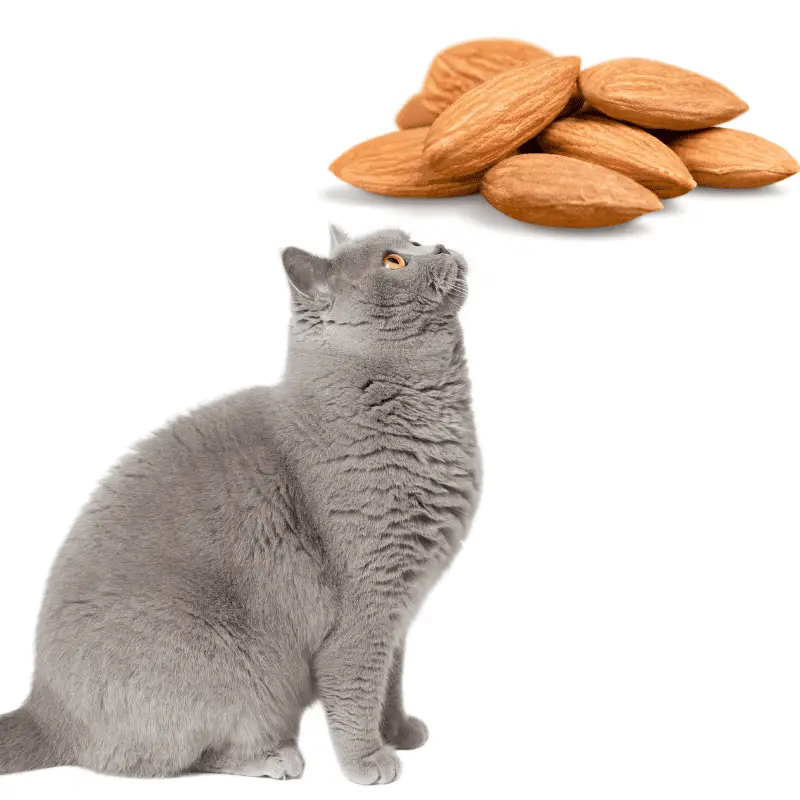Treating our cats with new foods can be somewhat exciting; however, some foods you must never feed your cat. Let’s find out if cats can eat almonds.
A cat should not eat almonds because not only are they a choking hazard, but they contain a toxin called cyanide and, in high doses, can be fatal to a cat. A cat’s digestive system is not designed to digest almonds, and if consumed, a cat can get an upset stomach. Too much high fat in the body can also lead to pancreatitis.
As you can see above, there are many reasons why you should not let your cat eat almonds. Let’s break it down one by one.
Choking Hazard
Due to the size and hardness of an almond nut, this can be a choking hazard to a cat. Eating almonds can also cause intestinal blockages in cats. It would be best if you were to avoid giving your cat almonds to prevent this.
Cyanide
While almonds only have a small amount in them, they will lead to cyanide poisoning if a cat consumed many almonds. However, it is not worth the risk to find out how many almonds would need to be a lot. So It would be best to avoid treating your cat with almonds.
Other Cyanide Containing Foods:
- Apple seeds
- Peach pits
- Cherries
- Apricot Kernels
- Lima beans
Cyanide Poisoning (Cats)
Cyanide poisoning will affect your cat’s oxygen levels, which is highly problematic for the heart and brain.
Upset Stomach
The digestive system of a cat is different from ours. It is different as they eat more of a meat-based diet. Introducing nuts will cause stomach upset because the digestive system has a better system required for meat and not plant-based. It can lead to diarrhoea and sickness, so it is best not to feed your cat almonds.
The main difference between a meat digestive system and a plant-based digestive system?
The main difference is that carnivores (meat digestive systems) have one stomach camber and a short intestinal tract to allow the meat to pass quickly through. While herbivore (plant-based digestive system) have several stomach chambers and have a much longer intestinal tract, this allows the body to break down fibre and absorb the nutrients.
Pancreatitis
Due to the high hard to digestive fats found in almonds, they can cause a build-up of fat within the cat body, resulting in pancreatitis attacks. The affected organs such as the heart, lungs and kidneys can shut down. An inflamed pancreas is highly uncomfortable for a cat and will need medical attention and a change in diet.
Symptoms of Pancreatitis:
- Lethargy
- Anorexia
- Diarrhoea
- Dehydration
- Excessive water drinking
Can Cats Eat Chocolate Covered Almonds?
A cat should not eat chocolate covered almonds. Chocolate is highly toxic to cats. As well as being a choking hazard, the almonds themselves contain a toxin called cyanide. A cat’s digestive system is not built to digest almonds or eat chocolate, and if consumed, it can cause poisoning, pancreatitis, and lead to death.
Avoid all almonds, including those with salt, flavourings, roasted, sweet. It would be best if you avoided all the almond varieties when treating your cat. It would help if you kept them out of reach from cats.
Conclusion
You now know that it’s important not to provide your cats with almonds. The best owner you can be is one that only provides them with well-balanced high-grade food. If you would like to treat your cat now and then, go for the meat choices such as chicken, turkey, beef, or if you are looking for non-meat treats, treat them to melon, rice or a small piece of banana.
Happy Cat Parenting!

